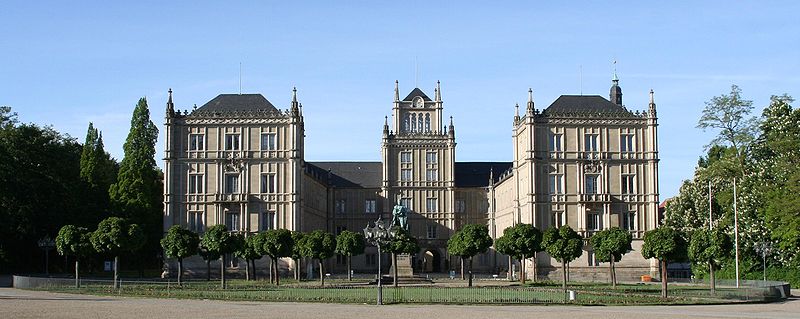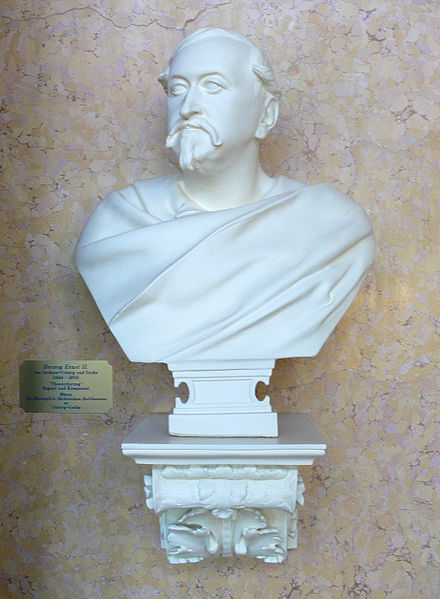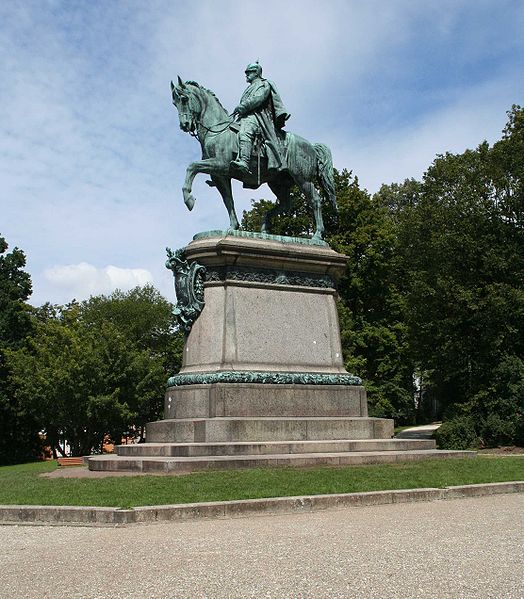<Back to Index>
- Philosopher Moses (Moshe) Hess, 1812
- Painter Rockwell Kent, 1882
- Duke of Saxe-Coburg and Gotha Ernest II, 1818
PAGE SPONSOR
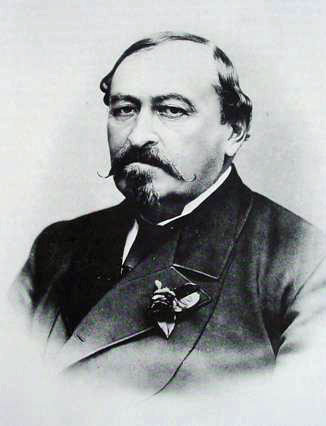
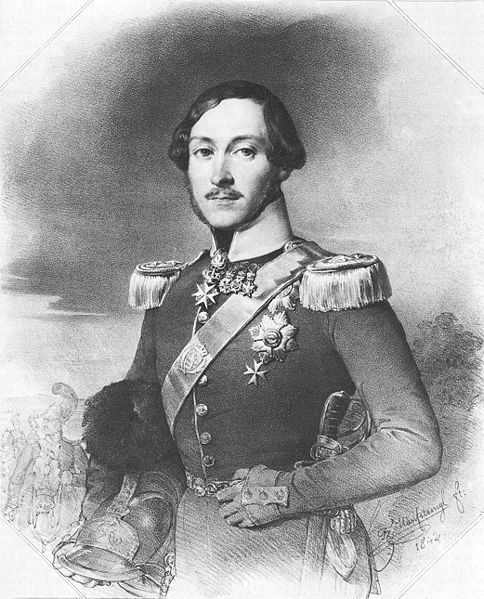
Ernest II Augustus Charles John Leopold Alexander Edward, Duke of Saxe-Coburg and Gotha (21 June 1818 – 22 August 1893) was the second Sovereign Duke of the German Duchy of Saxe-Coburg and Gotha. His reign saw the Austro - Prussian and Franco - Prussian wars, and the subsequent unification of Germany.
His position was often linked to his brother Albert, Prince Consort, the husband of Queen Victoria of the United Kingdom. Their relationship, along with his relations with Albert's family upon his death, experienced phases of closeness and troubles. Despite their increasingly differing political views, Ernest's succession allowed the duchies to be succeeded by his second eldest nephew Alfred, Duke of Edinburgh upon his death.
Ernest was born at the Ehrenburg Palace in Coburg on 21 June 1818. He was the elder son of Ernest III, Duke of Saxe-Coburg-Saalfeld and his first wife Princess Louise of Saxe-Gotha-Altenburg. He was soon joined by a brother, Prince Albert, who would later become the husband of Queen Victoria. In 1826, their father succeeded as Ernest I, Duke of Saxe-Coburg and Gotha through an exchange of territories. When he was fourteen months old, a servant commented that Ernest "runs around like a weasel. He is teething and as cross as a little badger from impatience and liveliness. He is not pretty now, except his beautiful black eyes". In May 1820, his mother described Ernest as "very big for his age, as well as intelligent. His big black eyes are full of spirit and vivacity". Biographer Richard Hough writes that "even from their infancy, it was plainly evident that the elder son took after his father, in character and appearance, while Albert strongly resembled his mother in most respects". Ernest and his brother often lived with their grandmother the Dowager Duchess of Coburg, until her death in 1831.
He and his only sibling Albert were brought up and educated together. According to their tutor, "they went hand-in-hand in all things, whether at work or at play. Engaging in the same pursuits, sharing the same joys and the same sorrows, they were bound to each other by no common feelings of mutual love". Perhaps the "sorrows" aforementioned related to their parent's marriage. It was not a happy one and Duke Ernest I was continually unfaithful. In 1824, Ernest I and Louise divorced; she subsequently left Coburg and was disallowed from seeing her sons again. She soon remarried to Alexander von Hanstein, Count of Pölzig and Beiersdorf, a commoner, dying in 1831 at the age of thirty. The year after her death, their father remarried to his niece Princess Marie of Württemberg, who was his sister Antoinette's daughter. Their stepmother was thus also their first cousin. The couple would have no children.
Ernest entered military training in 1836. In April 1837, Ernest and Albert and their household moved to the University of Bonn. It
was here that the two brothers went their separate ways. Ernest, as the
heir, had to be prepared for his future role, while Albert went
traveling around Europe. Most importantly for both of them, the
previous year Ernest and Albert had visited Princess Victoria of Kent and spent a few weeks at Windsor. Their
father first thought that Ernest would make a better husband to
Victoria than Albert, possibly due to the fact that his sporting
interests would be better received by the British public. Most
others favored Albert over Ernest as a possible husband however.
Temperamentally, Victoria was much more like Ernest, as both were
lively and sociable with a love for dancing, gossip, and late nights;
conversely, this fast pace made Albert physically ill. However, in 1839, the brothers traveled to England again. Victoria, now Queen of the United Kingdom, found her cousin Albert agreeable and soon proposed. This connection would have many implications upon Ernest in the future. In Karlsruhe on 3 May 1842, Ernest married twenty-one year old Princess Alexandrine of Baden. She was the eldest daughter of Leopold, Grand Duke of Baden and Sophie of Sweden, daughter of Gustav IV Adolf of Sweden. The marriage did not produce any children. Some suspect that Ernest was incapable of fathering children, as he had suffered from a venereal disease in his late teens and early twenties, most likely as the consequence of living a wild, promiscuous lifestyle. Ernest had been so visibly deteriorating in appearance as a result that Sarah Lyttelton, a lady-in-waiting of Queen Victoria, observed at Windsor in
1839 that he was "very thin and hollow-cheeked and pale, and no
likeness to his brother, nor much beauty. But he has fine dark eyes and
black hair, and light figure, and a great look of spirit and eagerness". Later
that year, Albert counseled his brother against finding a wife until
his 'condition' was fully recovered. He further warned that continued
promiscuity could leave Ernest incapable of fathering children. Ernest duly waited a few years before marrying as a result. On 29 January 1844, Ernest's father died in Gotha, one of the territories their family had recently acquired. Ernest consequently succeeded to the duchies of Saxe-Coburg and Gotha as Ernest II, Duke of Saxe-Coburg and Gotha. A contemporary source states that Ernest was a just and very popular ruler. The Duke had a reputation for being a strong friend of the United States, as did his brother Albert. He was, however, the only European Sovereign to appoint a consul to the Confederate States of America. Extravagant
to a great degree, Ernest had many money troubles throughout his reign.
In January 1848, Ernest visited his brother in the midst of political
unrest in Germany. Upon his return, he also discovered unrest in
Coburg. One of the many concerns related to finances. Although Ernest
had a large inheritance, he also had frequent debts. There
were increasingly many calls to nationalize most of his property.
Indeed, Albert had to intervene at one point and spare his brother the
embarrassment of losing one of his Coburg properties. During
the turmoil in Germany, Albert had been constructing his own liberal
reform plan, under which a single monarch, chancellor, and parliament
would unite the German states; in addition, each state would retain its
own current ruling dynasty. As
this plan pertained to his brother, Ernest was given a copy in the hope
that he would develop his own liberal constitution. Ernest subsequently
made a few concessions, but his position remained sound, not counting
the increasing problem of his debts. From 1848 to 1864, Denmark and the German Confederation fought over control of the two duchies of Schleswig and Holstein. Historically, the duchies had been ruled by Denmark since medieval times, but there remained a large German majority. This majority was sparked to rebellion after Frederick VII of Denmark announced on 27 March 1848 the duchies would become an integral part of Denmark under his new liberal constitution. Prussia soon became involved, supporting the uprising and beginning the First Schleswig War. Ernest sent 8,000 men initially, adding to the army sent by the German Confederation.
He also desired to have a military occupation during the war, but was
refused, as it was "extremely difficult to offer me a position in the
army of Schleswih-Holstein corresponding to my rank", according to his
memoirs. He agreed to a smaller command, coming to lead a Thuringian contingent;
he commented in a letter to his brother that "I should have declined
any other command of the kind, but I could not refuse this one, as, in
the present condition of our States, it is important to keep the
executive power in our hands". This
mention of maintaining autonomy perhaps refers to the views of some
Germans to create one solid state under only one monarch, ending the
other dynasties. The
first war ended in 1851, but would resume in 1864. During this
interlude, Ernest fervently opposed the marriage of his nephew Albert Edward, Prince of Wales ('Bertie') to Princess Alexandra of Denmark, a daughter of the future Christian IX of Denmark (and therefore an enemy of the German states). He believed that such a match flew in the face of German interests. While
Albert agreed, he could find no alternative bride, writing to Ernest
that keeping the affair a private matter (and outside the realm of
government) was "the only way to prevent a break with Prussia and the
only way to keep the game in our own hands, impose the conditions that
we think necessary, and as far as we can, take off its political edge". Soon
after writing this letter, Prince Albert died on 14 December 1861. His
death helped Ernest repair his relationship with his sister-in-law, as Victoria had
been becoming increasingly angrier over Ernest's objections to the
Danish match. The two brothers had always been close, whatever their
disagreements, and Albert's death left Ernest "wretched", noted
Victoria in a letter to her eldest daughter. This
death did not solve their argument however; seeing that his direct
involvement had failed to persuade Victoria, Ernest tried a new tactic.
He began to spread gossip about Alexandra and her family, and met
Bertie at Thebes, most likely attempting to discourage him from the match in person. In
a 11 April letter, Victoria unhappily noted to her eldest daughter "You
did not tell me that Bertie had met Uncle Ernest at Thebes... I am
always alarmed when I think of Uncle Ernest and Bertie being together
as I know the former will do all he can to set Bertie against the
marriage with Princess Alix". Despite his disprovable, Bertie was duly married to Alexandra on 10 March 1863. In 1862, Otto of Bavaria, King of Greece was
deposed in a bloodless coup. The Greeks were eager to have someone
close to Britain and Queen Victoria replace Otto; some desired to allow Alfred, Duke of Edinburgh (her second son) succeed as King of Greece. He was elected with 95% of the vote in the Greek head of state referendum of
1862. After his ineligibility was confirmed however, the Greeks began
looking for other possible candidates, which included Duke Ernest at
the British government's suggestion. To
their and Victoria's reasoning, if Ernest were to take the Greek
throne, Alfred could immediately take up his inheritance and succeed
Ernest as Duke. Many were in favor of his nomination, including Prime Minister Lord Palmerston and Ernest's sister-in-law. In a letter written to her uncle Leopold I of Belgium, Victoria stated her support for a new royal branch of the House of Saxe-Coburg and Gotha (as
Leopold had been chosen as King of Belgium in 1831) as well as her
desire for her second son Alfred to succeed his uncle as Duke. As negotiations continued however, she began to lose enthusiasm for the idea.
There
were problems to the nomination; Ernest had no children, and thus would
have had to adopt one of the princes of his house to succeed him as
King of Greece. To solve this problem, Ernest suggested to Palmerston
that he simply take the title regent of Greece and hold the kingdom in
trust for his chosen heir. He
also stipulated that if he accepted the throne, it should be subject to
certain guarantees by the other powers. The apparent deal-breaker
however was the fact that Ernest wanted to acquire the Greek throne and still maintain control of his duchies. In
the end, the English cabinet thought the proposed conditions unacceptable. His proposals turned down, Ernest in turn refused. In
1863, the Greek throne was accepted by another royal: Prince Vilhelm of Denmark. Ernest would later comment, "That this cup was spared me, I always regarded as a piece of good fortune". Ernest, like his brother, was in favor of a German unified, federal state. To best realize this goal, Ernest liked to dabble in whatever political system promised the most success. He
subsequently watched the growth of liberalism in Germany with much
interest and tried to build links with the movement's leaders. During
Albert's lifetime, Ernest took a close interest in the movement for
reform, and was perceived as a progressive within Germany. In 1863, he attended the liberal Frankfurt Conference, which was openly avoided by Prussia. Though his attendance made him no friends in Prussia, he developed such strong
contacts in Austria that many looked to him as a potential leader in
the mounting conflict between the northern and southern powers. He
grew tired of the advice he received from Albert on the subject
however; as Ernest 'was by no means inclined to consent to an energetic
rule such as I adopted immediately afterwards for the perfection of the
constitutional system', according to Albert. The Austro-Prussian War was
triggered by the desire of German conservative leaders to unify, albeit
on different terms than their liberal counterparts. Ernest had urged
Prussian leaders against the war, and was an active advocate of the
Austrian cause. Circumstances
had changed however, and although Ernest normally followed more liberal
politics than many of his counterparts, he had switched to views
followed more closely by the German Chancellor Otto von Bismarck by
1866. Despite the change in his private political views, he still had
strong Austrian ties, and no one foresaw that Ernest would immediately
side with the better equipped Prussians upon breakout of the war. His
reasoning, it could be said, can be best understood if one considers
that he was only acting in the best interests of his duchies, and by
extension, of himself. He
was indeed fortunate in his support of Prussia against Austria; many
other petty German dukes, princes, and kings who supported the latter
had suffered immensely after the Prussian victory. Hanover, Hesse-Kassel, and Nassau for
instance were all annexed to Prussia at the expense of their respective
rulers. Ernest was even allowed to ride at the head of his battalion
during the victory parade. Ernest' niece Prussian Crown Princess
Victoria commented "I am not accustomed to hearing so much praise of
Coburg here. [Ernest] was not among the crushed and beaten foe, it is
sad enough as it is to see so many of one's friends suffering from the
effects of their miscalculations". His
support of the Prussians meant he was no longer the potential leader of
a political movement; although it was true that he had been able to
retain his duchies, it had come at a price. According to historian
Charlotte Zeepvat, Ernest "was increasingly lost in a whirl of private amusements which earned only contempt from outside". Ernest
funneled his political thoughts into the private sphere, preferring to
write covertly sponsored articles in the Coburg press that became
increasingly embittered against England. In 1886, Ernest published a pamphlet that angered his family; though published anonymously, no one doubted that Co-Regents and Foreign Influence in Germany was written by Ernest. It attacked Crown Princess Victoria as a disloyal
German that was too dependent on her mother, and declared that she had
been too indiscreet in passing along confidential information during
both war and peacetime. Queen
Victoria was furious, writing to her daughter Victoria, "What you told
me of Uncle E and that pamphlet is simply monstrous. I assure you that
I felt great difficulty in writing to him for his birthday, but I wrote
it as short and cool as I could consistently with civility." He also supported the Prussians in the Franco-Prussian War. Late
in his reign, Ernest actions managed to continually anger his
sister-in-law. He put on weight and though on paper his wealth was
large, he was still constantly in debt. Victoria
was also displeased that Ernest was writing his memoirs, worrying about
their contents mainly in regard to her husband Albert. Despite their
disputes, Ernest still met with Victoria and her family occasionally.
In 1891, they met in France; Victoria's lady-in-waiting commented "the
old Duke of Saxe-Coburg-Gotha has been here today with his wife. He is
the Prince Consort's only brother and an awful looking man, the Queen
dislikes him particularly. He is always writing anonymous pamphlets
against the Queen and the Empress Frederick, which naturally creates a
great deal of annoyance in the family". An amateur composer all his life, one of Ernest's operas, Diana von Solange, was given to dismal reviews at the Metropolitan Opera in New York City in 1890. One account commented that its "music was simply rubbish". Throughout his life, Ernest had also composed other pieces of music, including Die Gräberinsel (1842), Tony, oder die Vergeltung (1849), Casilda (1851), Santa Chiara (1854), and Zaïre. Ernest was also an avid hunter and sportsman; one contemporary
commented that he was "one of the foremost and keenest sportsmen produced by the present century". In addition, Ernest was an enthusiastic patron of everything connected with natural history. Ernest II died at Reinhardsbrunn on 22 August 1893 after a short illness. A lifelong sportsman, his last words were apparently "Let the drive commence!" He was buried in the Moritzkirche; thousands of spectators came to the funeral, including Emperor Wilhelm and the Prince of Wales. Ernest was succeeded by his nephew Prince Alfred, Duke of Edinburgh. Prince Alfred, Duke of Edinburgh,
his brother's second eldest son, had been designated the childless
Ernest's heir since 14 December 1861, after his older brother the Prince of Wales (later Edward VII of the United Kingdom) renounced his succession rights. Issues
arose over authority to control the upbringing of his heir. As head of
the Coburg family, Ernest would normally have been able to arrange Alfred's education and general upbringing unchallenged. This
however was not the case. Alfred was torn between his English birth and
his German inheritance. This was partly due to the fact that Alfred was
his brother's heir to the United Kingdom until the birth of Prince Albert Victor, Duke of Clarence and Avondale in
1864. One example of the many problems of his education concerned the
language he would speak. Although he grew up learning German, his
native language was decided to be English. In addition, a naval career
was chosen for Alfred, a common profession for a British prince but
almost unheard of for a prince of Germany. Ernest
also wanted Alfred to be educated in Coburg, but his brother refused.
Albert's refusal most likely stemmed from the negative British reaction
that would have inevitably occurred and the fact that Albert was
fearful of Alfred's moral development. Thus
despite Ernest's protests, he went unheeded in Albert's lifetime. In
1863, Ernest told Victoria that it was time for Alfred to leave the
navy and enter a German university. By March of the following year, it
was decided that Alfred would attend Bonn University but be left to
consider his future, as he was having reservations over permanently
residing outside of England. The
matter was eventually resolved; Alfred came to accept his inheritance,
and Victoria understood and accepted that Ernest needed to be involved
in the upbringing of his heir.
